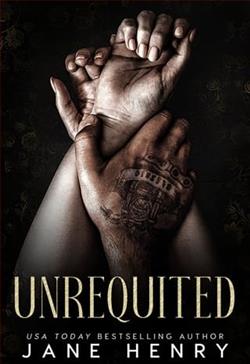Page 109 of The Daughters of Avalon
This was not the time for fantasies, and there was too much at stake here—war games,politiks, deception, brothers at odds—the realm was in peril. And if there was one thing shemustaccept, it was that Elspeth was right. She might not share Elspeth’s love forpolitiks, nor any true affection for Matilda, but she now understood what a precarious path they were traveling as a nation, and if Matilda did not reclaim their father’s throne, England might be lost.
For all these many months in London, Rosalynde had been so preoccupied with her own troubles that she hadn’t had much of an inkling what was happening elsewhere in the realm. To her mind, there were only two places of consequence—Blackwood, where she believed Rhi was being held, and Aldergh, where her sister Elspeth had gone. Unlike Elspeth, she hadn’t much interest to know about the Empress Matilda, what she was doing, who was whispering in her ear, or where she was going. Alas, she and hertruesisters had more immediate concerns, and despite that she shared blood ties with Henry’s daughter, Rosalynde could scarcely even recall Henry, much less a distant half-sister.
Now, in the fourteenth winter since Henry’s death, why should she bother to care about a sister who was twenty-seven years her senior, and who’d never once troubled herself over their welfare?
Quite certainly, Matilda didn’t care about them, and, for all that Elspeth seemed to admire the lady, she mustn’t care about Elspeth either.
And yet why should she?
Their father had sired many, many bastards, and despite that Matilda had loved Robert of Gloucester, it was probably because they were more of an age. She and Matilda were not, and they scarcely knew of each other. When Matilda left England to be married at the age of twelve, Rosalynde wasn’t even born yet. When she returned to court after her husband died, Elspeth herself was but two. Three years later, when she’d marriedGeoffrey d’ Anjou, even then, Rosalynde and Arwyn were scarce seedlings in their mother’s womb.
Half a lifetime had already passed for Matilda by the time Rosalynde and Arwyn came wailing into the world. And, for those few times their half-sister had paid attendance to their father in London after their birth, she could scarce have been asked to bother with Morwen’s brats. In her shoes, Rosalynde wouldn’t have either. Not only was Morwen Henry Beauchamp’s whore—a woman who’d disrespected her mother’s memory—but even then, Matilda and Morwen had been at odds.
None of that mattered here and now. What did matter was her real sisters, and no man should come between them.
And anyway, she didn’t even know for sure that Giles had repudiated Seren. For all Rosalynde knew, it simply hadn’t been appropriate for him to bring her home—and here she sat pining over a man who didn’t even know her true face.
How ludicrous was that?
Perhaps, after all, Giles was looking forward to wedding her sister… and mayhap Seren, too, had found him appealing. Who wouldn’t? Only now, Rosalynde was behaving like a wanton, prepared to throw herself into his arms—and why? Because she had some silly notion that the Goddess may have deigned to send her a champion… as she had for Elspeth?
This was hardly a fae’s tale. Lives were at stake, and hers no less than anyone else’s. She hoped, in truth, that the Goddess had been gracious enough to send her a champion, but it mustn’t be for flights of fancy. She had her mother’sgrimoirein her possession, and if she didn’t keep her wits about her, she would lose it, and lose her life, as well.
Moreover, if she wasn’t careful, she would send these brothers to their deaths, as well.
That was a sobering thought.
Brooding now, she held thegrimoireclose, trying to remember what she knew of Giles de Vere—not much.
He was a younger son, come into his inheritance after the death of his sire and an elder brother. Morwen had had little more to say about the man, but Rosalynde had never sensed that her mother wished to give Seren up so easily—not to some lowly northern lord, who hadn’t any true power or influence. In fact, she’d had the impression that Morwen was furious over the betrothal and that she might thwart the king if she could. Perhaps, after all, that’s what waylaid her? Perhaps she’d angered Stephen and he had locked her away, as his wife so oft threatened to do.
To be sure, the Queen Consort was no wilting flower. As diminutive as the lady might be, she swept through Westminster’s halls with a stature that cowed men twice her size. Nor did she concern herself with niceties. The one time the sisters had been left alone in her company, she’d informed them rather baldly that her mother should bepersona non grata, and that the only reason she was not, was because of her. Simply because Morwen was useful, the Queen would continue to pave the way for the Pendragons in her court, but if a one of them crossed her, they would see how fast they would be put out the door.
Rosalynde also remembered Elspeth telling a story about the day they were summoned to meet Stephen for the first time—right after his coronation. Rosalynde was far too young to remember the occasion, but apparently, the Queen had marched into their mother’s quarters and informed Morwen in no uncertain terms to be discreet with her lord king, lest she defy her husband and feed Morwen’s eyeballs to her precious birds.
No one spoke to Morwen that way.No one.But, after all, there must be something dark in Stephen’s queen, because what sort of wife conspired with a husband’s paramour? What sort ofmother encouraged a son—England’s heir—to disport where her husband had already dared?
In Rosalynde’s opinion, if, in truth, England fell to ruin, the fault would lie as much with Maude as it did with Morwen.
But, for all that he’d stolen her father’s crown, Stephen seemed more reasonable. Certainly, he was kinder, and Rosalynde had a niggling sense that he was a man caught in a spider’s web, and his queen was as much a poppet master as her mother. Alas, she also sensed the king was growing weary of his throne. Rumor had it that he was preparing to abdicate to his son—completely unheard of in England, though they often did such things in France—and if he did, Morwen and Stephen’s Queen would gnash their teeth like wolves, and God help Eustace, the poor, arrogant fool. He was too stupid, greedy, shortsighted and godless to survive them. They would rend him in two like a rag doll.
The thought gave Rosalynde a shiver, and she shivered again, feeling the first signs of cold. And not merely the cold…
It was all she could do to keep her head from lolling and her eyes wide open. In her current state, she doubted she would have any recourse against her mother. She would lie down at Morwen’s feet and snore herself into an early grave.
Gooseflesh erupted on her skin as Giles slid an arm about her waist, pulling her close, lending his warmth and his support. This time her shivers had naught do with the weather.
“Rest,” he said. “We’ll stop soon.”
The tenderness in his voice startled her, and the warmth of his breath against her nape made her heart flutter wildly. She said not a word—couldn’t speak, because now the tightness of her throat strangled her words. But she nodded, shivering as she laid her head back to rest against his shoulder.
Goddess have mercy, despite having spent the past hour talking herself out of girlish fancies, she dared to revel in the warmth and safety of his arms.
Chapter
Thirteen
She was in a castel that could only be Blackwood.















